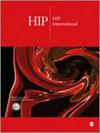Reliability of the transverse acetabular ligament as a landmark for functional cup anteversion in total hip arthroplasty
IF 1.3
4区 医学
Q3 ORTHOPEDICS
引用次数: 0
Abstract
Background:The transverse acetabular ligament (TAL) can be a useful and reproducible landmark in the orientation of the acetabular cup in total hip arthroplasty (THA). Its role in guiding cup orientation when aiming to implant in a functional anteversion orientation is unclear. The aim of this study was to assess the relationship between the TAL and the planned acetabular cup anteversion when implanted in a function orientation.Material and Methods:In a retrospective study the anteversion of the TAL in the contralateral un-replaced hip was measured in CT scans of patients undergoing THA and compared to the functional cup anteversion using the patient-specific spinopelvic parameters. Comparative measurements of the native acetabular version were made from the superior rim to the inferior rim and at 10 mm intervals between the 2, all in reference to the anterior pelvic plane.Results:96 hips were measured. The mean TAL anteversion angle was 17.2° ± 4.5°. The mean planned acetabular cup anteversion angle was 26.3° ± 4.7°. Pearson’s correlation coefficient of this measurement with the TAL was −0.03 ( p = 0.769). There was a significant difference between the planned acetabular cup anteversion and the measurement of the TAL ( p < 0.0001).Conclusions:If cups are implanted parallel to the TAL, almost 80% will be >5° different to targeted functional cup version. It should be aimed to implant cups with more anteversion than the TAL indicates.将髋臼横韧带作为全髋关节置换术中功能性髋臼杯内翻的标志的可靠性
背景:在全髋关节置换术(THA)中,髋臼横韧带(TAL)是髋臼杯定向的一个有用且可重复的标志。但在以功能性内翻方向植入时,其在引导髋臼杯方向方面的作用尚不明确。材料和方法:在一项回顾性研究中,对接受全髋关节置换术的患者进行 CT 扫描,测量对侧未置换髋关节中 TAL 的前内翻,并使用患者特异性脊柱参数与功能性髋臼杯前内翻进行比较。从髋臼上缘到髋臼下缘以及两者之间10毫米的间隔对原生髋臼进行比较测量,所有测量均以骨盆前平面为参照。平均 TAL 内翻角度为 17.2° ± 4.5°。计划髋臼杯内翻角度的平均值为 26.3° ± 4.7°。该测量值与 TAL 的皮尔逊相关系数为 -0.03 ( p = 0.769)。结论:如果植入的髋臼杯与 TAL 平行,则近 80% 的髋臼杯与目标功能杯的角度相差 5°。应尽量植入比 TAL 显示更多内翻的髋臼杯。
本文章由计算机程序翻译,如有差异,请以英文原文为准。
求助全文
约1分钟内获得全文
求助全文
来源期刊

HIP International
医学-整形外科
CiteScore
4.20
自引率
0.00%
发文量
70
审稿时长
2 months
期刊介绍:
HIP International is the official journal of the European Hip Society. It is the only international, peer-reviewed, bi-monthly journal dedicated to diseases of the hip. HIP International considers contributions relating to hip surgery, traumatology of the hip, prosthetic surgery, biomechanics, and basic sciences relating to the hip. HIP International invites reviews from leading specialists with the aim of informing its readers of current evidence-based best practice.
The journal also publishes supplements containing proceedings of symposia, special meetings or articles of special educational merit.
HIP International is divided into six independent sections led by editors of the highest scientific merit. These sections are:
• Biomaterials
• Biomechanics
• Conservative Hip Surgery
• Paediatrics
• Primary and Revision Hip Arthroplasty
• Traumatology
 求助内容:
求助内容: 应助结果提醒方式:
应助结果提醒方式:


